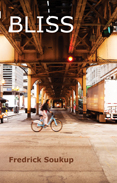
 |
The search for a meaningful life receives fresh treatment in this thoroughly modern tale of a man torn between two worlds. Connor abandons his plans for medical school and moves to Chicago's inner city. He works in a warehouse, volunteers at a community center, and slowly forms bonds with the kids seeking refuge at the center. In his restless search for connection and purpose, he falls in love with Danielle, a woman whose life is inextricably linked to the desperation and hope of her Chicago community. Then Connor, wracked with infinite uncertainty about his future, returns home to his upper-middle-class upbringing and swiftly gets entangled in a white-collar career, unexpected fatherhood, and suburban malaise. But the track of Connor's life continues to curve and swerve. He is always in the driver's seat, looking for a way back to the life he really wants with Danielle.
Soukup tackles many issues in this thoughtful, soul-searching story. Social justice, white privilege, the economic divide, and the American Dream hover at the edges of the story in subtle ways and overt conversations between characters. In this way, the story shines with authenticity and realism as Connor encounters two starkly contrasting worlds of plenty and want. He has the luxury of choice and an opportunity at a sort of dress rehearsal for each life—a trial run to see what actually brings contentment. He is also bold enough to pursue the path less traveled despite familial pressures to conform. Brimming with social observation and keen insight, Soukup captures the desire for self-determination. With dialogue that sparkles with intelligent verve and sharp awareness, each page crackles with wisdom. The story tackles all the big quests in modern life related to the pursuit of love, lifestyle, and work with startling results.
A 2020 Eric Hoffer Book Award Category Finalist
RECOMMENDED by the US Review